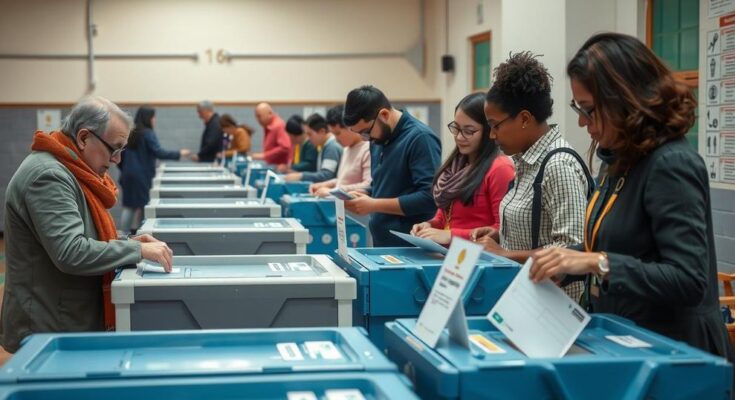Chad held a general election amid calls for boycott by the opposition, leading to an expected low voter turnout of 38%. Opposition leaders, like Succes Masra, criticized the process, asserting that results had been predetermined. President Deby urged participation, claiming the day was historic for the nation’s democratic transition. With underlying societal and security issues, the elections are pivotal yet contentious as Chad seeks stability post-military rule.
Chad held a general election on Sunday, which the government characterized as a pivotal move towards concluding three years of military governance. However, the opposition, who advocated for a boycott, anticipated a low voter turnout, estimating participation at only 38 percent. Election officials attributed this apathy to unfavorable weather conditions, while opposition leaders claimed that most voters had adhered to their call to avoid the polls, declaring that the outcome had already been predetermined.
The election, which is intended to elect representatives for the parliament, provincial assemblies, and local councils, has been criticized by figures such as Succes Masra, the leader of the Transformers party. Masra asserted that the populace demonstrated resistance to the electoral process, while President Mahamat Idriss Deby Itno encouraged citizens to participate, proclaiming the day to be historic and unique.
Polling also revealed sentiments of disengagement among voters, with individuals like Herve Natouingan questioning the efficacy of voting due to perceived systemic issues. Despite difficulties, some residents expressed hope for positive conditions, such as employment and social equity, contingent on electoral outcomes.
With the backdrop of security threats from jihadist groups and ongoing climatic struggles faced by nomadic communities, the elections are underscored by domestic and regional instability. The government positions these elections as crucial to the transition towards democratic governance, following President Deby’s ascension to power in 2021 after his father’s longstanding rule.
Chad has been under military rule since 2021 when President Mahamat Idriss Deby Itno assumed leadership following his father’s death. The current elections are perceived as integral to reestablishing democracy in a nation rife with political turmoil and societal issues. Engagement in these elections is further complicated by a call for boycott from opposition parties, which highlights tensions between the current regime and dissenting voices within the country. The opposition’s encouragement to abstain from voting reflects a broader disillusionment with the governing political structures and the societal demands for change, particularly in the face of issues such as unemployment, inflation, and civil rights. Amidst these dynamics, the government’s narrative emphasizes the elections as a significant step toward restoring stability and legitimacy.
In sum, the recent general election in Chad reflects a complex interplay of political dynamics, marked by opposition-led boycotts, public disillusionment, and governmental aspirations for legitimacy. While officials claimed a substantial turnout among certain demographics, many citizens remained skeptical of the electoral process, citing predetermined outcomes. The elections occur against a backdrop of regional instability, heightening concerns regarding Chad’s journey towards a democratic transition as it confronts significant internal challenges.
Original Source: www.khq.com




